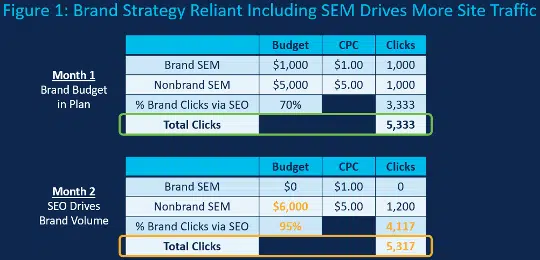Why you should invest in branded keywords even if your company ranks #1 on Google
Investment in brand keywords is critical because it allows you to directly influence your brand’s presentation on the SERP.
Search marketing is generally seen as a core tactic within digital marketing programs.
Capturing the intent of users actively searching your products or solutions is a no-brainer, right?
What seems like a simple question, can often be complicated.
Whether it’s due to budget-constrained environments or the brand having a stellar SEO team, I’ve fielded the same question for nearly every brand/client I’ve worked with:
“Why should I pay for brand search clicks, if our organic search listing is right at the top of the page?”
To be fair to those non-PPC stakeholders who may be reading this article, it is a valid question to ask. ]
Logically, I understand why it is appealing to capture free clicks and focus PPC budgets on tactics that will pull in new customers; however, there is a 1+1=3 effect to SEO and PPC results showing in conjunction.
Let’s look at some of the top reasons why brands should remain invested in their brand keywords.
1. SERP authority
Search engines are a part of daily life. Billions rely on search engines to answer information gaps in real-time, every day. They are a brilliant resource that only increases in terms of adoption and value.
Given how frequently we use search to solve problems, our brains naturally establish a correlation between the position of a search result and its relevance to our original query.
While a bit dated, Microsoft and Google have published studies confirming this notion.
If you still aren’t convinced, just look Google’s and Microsoft’s recent earnings – clearly, advertisers perceive this placement as valuable.
Search ads sit above the organic listings in premium real estate – directly below the search bar. Search ads are typically the first thing a user sees after initiating a search.
Not only does your ad box out competition from this prime real estate – which lowers the effectiveness of their competing offers – but in addition you have freedom to control the message users are seeing.
While site content can be optimized for search results, PPC provides full autonomy over the presentation of your brand’s message.
The impact of brand SERP management increases as the size of our screens shrinks.
Mobile searches continue to rise across nearly all categories of searches. Controlling the top result of a mobile brand search is critical, as the searcher’s attention is concentrated on the limited listings that make it above the fold.
Combine your search ad with the top organic listing (due to your team’s great SEO work) and you are now controlling the top of the SERP and with it, the prospect’s (nearly) full attention.
2. Auction dynamics
This is the most straightforward rationale for brand search keywords. Simply put, you’re getting much more bang for your buck with brand investment.
Take a step back and think about the purpose of search engines. They try to provide users with the optimal experience, meaning the most relevant results for a query. If you’ve run competitor keywords before, you’ve likely seen this in action.
Engines charge a surplus for clicks on competitor terms, based on the lower relevance of your ad and landing page. In my experience, competitor clicks have ranged from 5-25x more expensive than brand clicks.
Consider the SERP authority previously discussed and the economies of search engine auctions. Even if your brand budget is reallocated towards generic or competitor terms, it is possible (if not likely) that you will see an aggregate decrease in site visits.
Such approaches lean exclusively on SEO for brand visit volume, while reducing the effectiveness of your PPC budget.
Even if SEO captured 100% of the visits previously driven by PPC ads, the incrementality of reinvesting in nonbrand/competitor terms is unlikely to move the needle, due to the relative inefficiency of nonbrand/competitor investments.
To illustrate this, I’ve created a realistic simulation below of how redistribution of brand investment into nonbrand campaigns could actually yield lower total traffic to the site, due to the relative inefficiency of nonbrand volume.

In this scenario, the $1,000 that had previously been allocated to brand campaigns is now shifted to nonbrand. Despite SEO results capturing 95% of all brand traffic, we still see about even total traffic month over month, as we netted 800 fewer PPC clicks by shifting from brand to nonbrand.
Setting up clean measurement for your own business is critical, should you find your brand investment threatened.
Work with your analytics teams so that you show how any shifts in investment are impacting total traffic to the site.
3. Meet the customer where they search
Though digital marketing has evolved in terms of the complexity of tactics, it’s important to remember why search marketing is so effective.
Folks searching for your brands are seeking out additional information about your brand. They are telling you what they are interested in learning more about.
We don’t need to identify those who are close to purchase, as they are revealing that via their chosen queries.
Search is often referred to as a pull channel because we do not need to push ads in front of users. This is an opportunity to meet those expressing interest in your brand with a catered message.
Using an offline analogy: it’s similar to someone approaching the front door of your store, but you don’t have the lights on and have the blinds down.
Never take your most engaged audiences for granted. Open the store up and show them what you believe is the best offer to get them in the door.
4. Messaging autonomy
It’s been mentioned in a couple of the aforementioned arguments, but the value of catering your message for users who are interested in your brand is far greater than the cost of the click.
In order to establish SERP authority or convert those prospects interested in your brand, you need a catered message that shows prominently at the top of the page.
I’ve been lucky to work with some incredible SEO professionals and it is fascinating what they do to influence a site’s performance; however, there is an element of certainty with PPC that cannot be replicated.
We all tune into this blog on a recurring basis, as we are aware there are variables on search engines that are out of our control, which can have a meaningful impact on site performance.
PPC provides an opportunity to customize the message, based on known attributes of the user. Whether its an early interaction in which you want to establish your brand’s credibility or someone who has been to your site many times, PPC provides you the flexibility and autonomy to control how your brand is perceived on some of the most frequently visited sites on the internet.
Brand search is a critical tactic that advertisers need to maintain support for at all costs.
There are few other places on the internet where prospects are actively seeking out more information regarding your business.
If in fact you are being asked a similar question, here are some tips for how to manage that conversation:
- Don’t panic: Seriously! It’s a common question to receive and comes from a logical perspective. It is our job as specialists to educate why brand search is so valuable.
- Consult your platform reps: If you are working for an agency or brand with existing platform partnerships, lean on your reps as they have data that quantifies the impact of SEO and PPC in conjunction. If not, Google Support should be able to point you toward useful resources.
- Turn to the numbers: Brand search is one of the most cost-effective digital marketing tactics. Work with your analytics team/lead to build a data-driven story.
- Measure impact: If budgets do end up being reduced, make sure you have a measurement in place that quantifies the impact and how much volume is being recaptured by your SEO listings.
Contributing authors are invited to create content for Search Engine Land and are chosen for their expertise and contribution to the search community. Our contributors work under the oversight of the editorial staff and contributions are checked for quality and relevance to our readers. Search Engine Land is owned by Semrush. Contributor was not asked to make any direct or indirect mentions of Semrush. The opinions they express are their own.


